Updated list of Member Federations having right to vote at GA 2024 published
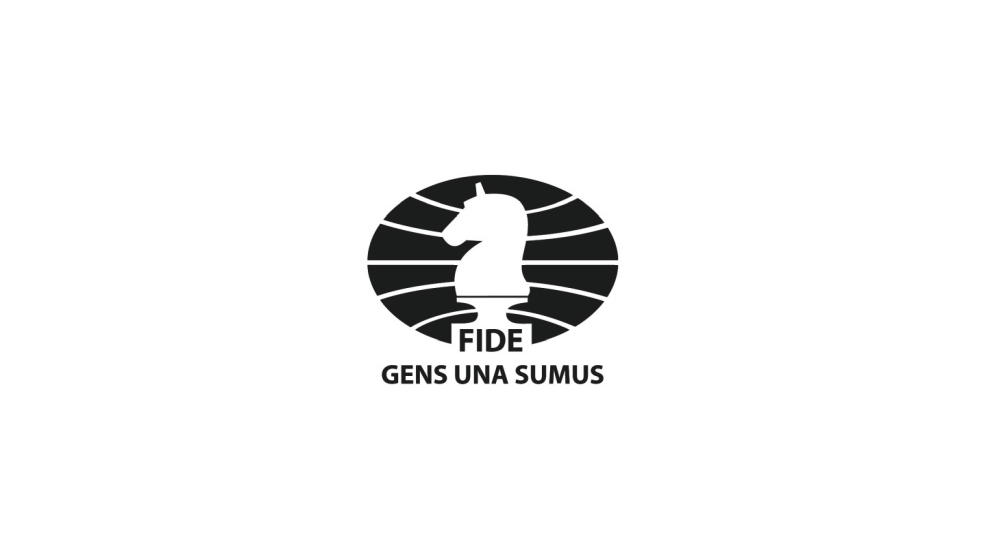
According to the FIDE Electoral Regulations, FIDE is publishing the updated list of Member Federations having right to vote at the General Assembly 2024 together the list of suspended Member Federations. Member Federations having right to vote at the General Assembly 2024 (PDF)
Travel information for World Senior Championships 2024 in Porto Santo, Portugal

The FIDE World Senior Chess Championships 2024 will take place in Porto Santo, Portugal, from November 16 (arrival) to November 29 (departure) 2024. Participants in all categories will share the total amount of 42,500 Euros. The registration deadline is September 16, 2024. The Portuguese Chess Federation constantly updates useful information on how to get to Porto Santo. There are several options for reaching the island: by air or ferry. Find out more about a charter flight from Lisbon to Porto Santo on November 16, returning on November 29. More information is available on the dedicated webpage:worldsenior.fpx.pt/how-to-get-to-porto-santo/ E-mail: worldsenior@fide.com Helpline via WhatsApp: +351937245507 (in English, French, German, Russian, Spanish, Portuguese, and other languages to assist you with information, Visas and travel arrangements) Regulations and invitation letter (PDF)
Women and Records in the spotlight at 45th Chess Olympiad
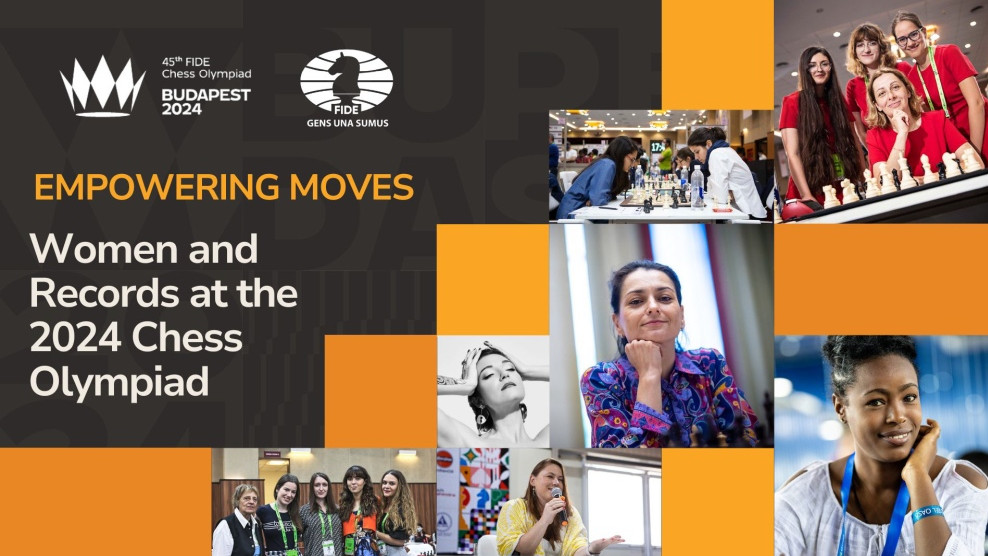
Budapest is set to host the 45th Chess Olympiad from 10 to 23 September at the BOK Csarnok events venue. This year’s Olympiad marks a new era, with several significant milestones: it will feature the highest number of participating teams in history, including a record number of women’s teams. Notably, Hungary will be represented by three women’s teams at this premier global chess event. As one of the world’s largest sporting events, the Olympiad will see 196 teams competing in the Open Section and 184 teams in the Women’s Section. “I’m delighted with the record number of teams, particularly the remarkable growth in women’s participation. This is the closest the ratio of men’s to women’s teams has ever been in the history of the Chess Olympiads,” said Dr. Zoltán Polyánszky, President of the Hungarian Chess Federation. “This progress is inspiring for women’s chess, but it also draws on deep traditions. In the 1970s and 80s, the renowned teams featuring Mária Ivánka and Zsuzsa Verőci earned four silver and two bronze medals in the FIDE Chess Olympiads, followed by the Polgár sisters and Ildikó Mádl winning two golds. Later, Zsuzsa Polgár became the Women’s World Champion, and Judit achieved groundbreaking results in men’s chess, setting an example for future generations. At this year’s Olympiad, I’m proud to highlight that of the 10 competitors on our women’s A and B teams, five are competing as mothers. Balancing these two roles requires extraordinary effort and exceptional organizational skills, and we are proud of them and especially grateful for their dedication.” The International Chess Federation (FIDE) has initiated programs to ensure women have equal opportunities to participate in chess. The FIDE Women’s Commission launched a special project, the National Female Team Imitative, to enable more countries to send women’s teams to the Chess Olympiad. Each of these teams represents a significant step toward gender equality in chess. Over the past year, the program has supported the preparation of women’s teams from nine countries: Liechtenstein, Guernsey, Grenada, St. Vincent and the Grenadines, St. Kitts and Nevis, the US Virgin Islands, St. Lucia, Nauru, and the Cayman Islands. The debuting teams received financial support, expert coaching, and substantial mental and material support for their training sessions in July and August. “Taking our first-ever female team to the Olympiad is a milestone that highlights the progress we’ve made in increasing the number of women playing chess in St. Lucia. This achievement will undoubtedly inspire more females to take up the game. Our team members were selected from our Schools Chess Championships and the Queens Gambit Challenge Initiative. I’m proud to say that the majority of our preparation was supported by the training provided through the FIDE Commission for Women’s Chess National Female Team Initiative,” said TrisAnn Richards, President of the Saint Lucia Chess Federation. Additionally, the FIDE Women’s Chess Commission introduced a pilot project called ChessMom earlier this year. This initiative provides support to female players with children under one year of age. In the past, many women were unable to participate in the Olympiad due to the challenges of being away from their children or finding childcare during competitions. The Commission addressed this by recognizing each child and caregiver as official members of their national delegation, ensuring they receive lodging, meals, and all the other benefits provided to delegation members. Participants in this project include Alina Kashlinskaya (Poland), Nana Dzagnidze (Georgia), Yuliia Osmak (Ukraine), Aster Melake Bantiwalu (Ethiopia), Rauha Shipindo (Namibia), and Nolwazi Nkwanyane (Eswatini). FIDE aims to establish this support system for chess-playing mothers as a standard feature, expanding the pilot project into a full program for future competitions. Dana Reizniece-Ozola, Deputy Chair of the FIDE Management Board, emphasized FIDE’s commitment to promoting women’s chess: “FIDE is deeply committed to empowering women in chess by creating opportunities and providing the necessary support to help them excel. Whether through initiatives like the ChessMom program or supporting the participation of new teams at the Olympiad, our goal is to ensure that women in chess have the same opportunities to succeed as their male counterparts.” Adding to the celebration of women in chess, Chilean singer and performance artist Juga will launch a unique art project in Budapest. Known for her chess-inspired work, Juga is filming a new video in Budapest to honor women in chess worldwide. The short film will showcase the top female chess players from 160 countries, as well as women who contribute to chess as teachers, streamers, photographers, referees, and officials. Filming will take place on September 17, a rest day for the Olympiad, at the iconic Hungarian Fine Arts Museum in Budapest. The video will feature her song ‘Queen Trap’ and Juga has promised that she will represent female chess players in a way that has never been done before. Juga is hoping to work with all of the Olympiad’s female competitors where a number of international stars have already signalled their participation, including Judit Polgár, Alexandra Kosteniuk, Elizabeth Paehtz, Bibisara Assaubayeva, and Tania Sachdev. As part of this year’s Chess Olympiad, the FIDE Commission for Women’s Chess hosts “Women&Chess&Balance” conference on 21 September 2024. More information can be found here: https://wom.fide.com/womconference/. “I am extremely excited that FIDE Commission for Women’s Chess implemented so many incredible projects. FIDE will continue thriving in this meaningful direction! Taking the opportunity I would like to invite you all to the Conference to attend the conference,” said Anastasia Sorokina, Chair of the FIDE Commission for Women’s Chess. About the FIDE Chess Olympiad The 45th Chess Olympiad is being organized by the Nemzeti Rendezvényszervező Ügynökség Nonprofit Zrt (Hungarian National Events Organizing Agency) in collaboration with the Hungarian Chess Federation and FIDE. The event will run from September 10 to 23, featuring a variety of free chess activities and programming at the BOK Csarnok venue. The tournament will be broadcast live with expert commentary. Organizers will also host numerous additional programs and side events, including the exhibition dedicated to the 100-year anniversary of FIDE. Children new to chess can learn the basics in a
French Championship 2024: Moussard and Daulyte-Cornette win titles

Jules Moussard and Deimanté Daulyte-Cornette are the new chess champions of France. Just like a year ago, the French Chess Championship 2024, 16-player knockout tournaments held in open and women’s sections, took place from August 16-25 in Alpe d’Huez, France. In case of a tie after two classical games, a 2-game Rapid (15+10) was played, followed by a 2-game Blitz (5+3) and an Armageddon (5 vs 4) if needed. The competition brought together the best French players except for Alireza Firouzja and Maxime Vachierv-Lagrave, battling in the 2024 Sinquefield Cup. On his way to the final, Jules Moussard beat Marie Sebag (the only female player who played in the open section) in the round of 16, then prevailed over Sebastien Maze on the blitz tiebreaker in the quarterfinals and finally defeated Romain Edouard in the rapid games. Laurent Fressinet’s path to the final was even more challenging, as he had to play two Armageddon games in the round of 16 and the quarterfinals (battling past Matthieu Cornette and Peio Duboue) and defeating Pierre-Laurent Paoli in the semis. As expected, the final was a very tightly contested match. The opponents traded victories in classical and rapid games, but Jules Moussard won both blitz games to clinch his second national title. Romain Édouard defeated Pierre Laurent-Paoli in the small final and took bronze. The women’s final featuring Deimanté Daulyte-Cornette and Pauline Guichard was also a close affair that came down to blitz. After drawing the first game, Deimanté Daulyte-Cornette emerged victorious in the second one and secured her maiden national title. Sophie Milliet completed the podium after besting Mitra Hejazipour in the match for third place. Photo: official website Official website: alpedhuez2024.ffechecs.org/
FIDE World Rapid & Blitz Championships 2024: Making history on Wall Street

New York City will become the epicenter of the chess world as the FIDE World Rapid & Blitz Championships make their North American debut from December 26-31, 2024. The iconic Wall Street backdrop will set the stage for a thrilling competition as the world’s top chess players converge in the heart of global finance. Fast chess formats, including Rapid and Blitz, are among the most exciting in the sport, demanding quick decisions, sharp instincts, and nerves of steel. These fast-paced games are not only a test of skill but also of mental endurance, making them a favorite among players and spectators. Adding to the excitement, another addition to this year’s event is a free day between the Rapid and Blitz Championships, which will be dedicated to Chess Davos – an exclusive conference exploring the intersection of chess and finance. “This is going to be a unique event in so many ways. Top chess grandmasters will gather at the financial heart of the world, and what fascinates me is the enormous concentration of the sharpest minds and the synergies that will be born,” said Emil Sutovsky, FIDE CEO. “I’m very much looking forward to an event that has everything it takes to become a landmark, ‘I-was-there’ kind of gathering.” A Monumental First in the Heart of the United States Wall Street, synonymous with power and intensity, provides the perfect backdrop for this high-stakes event. The 2024 FIDE World Rapid & Blitz Championships promise to be the most spectacular yet, as chess converges with the beating heart of global finance. This historic occasion marks the first time the event is held in North America, bringing the excitement and prestige of chess to new heights in the United States. The championship is a widely broadcast and watched event, and all eyes will surely be on Wall Street this December. “This year’s FIDE World Rapid & Blitz Championships represent a historic milestone for chess, bringing the event to North America for the first time and returning to New York, a city with a rich chess tradition,” said Arkady Dvorkovich, FIDE President. “This year, as we celebrate FIDE’s centenary, it’s fitting to reflect on the legendary New York International Chess Tournament held exactly a century ago, marking a glorious era for chess in the United States. Now, as chess enjoys a new golden age in the U.S., we are excited to bridge this glorious past with a prosperous present.” A New Schedule This year, FIDE has introduced a new schedule designed to enhance the experience for players and spectators. The event kicks off with the Rapid Championship from December 26 to 28, followed by a day off on December 29. The competition will resume on December 30 and 31 with the Blitz Championship. Get ready to be part of the electrifying atmosphere! Tickets for both general admission and VIP packages will be available to the public soon. Stay tuned for more details in the coming weeks. Join us in New York for an unforgettable celebration of chess on Wall Street. With an iconic venue, an exciting new schedule, and massive global interest, the 2024 FIDE World Rapid & Blitz Championships are set to become a landmark event in the history of chess. Contact email for participants: worldrapidandblitz@fide.com
FIDE Solving Championships: Free online lessons for anyone
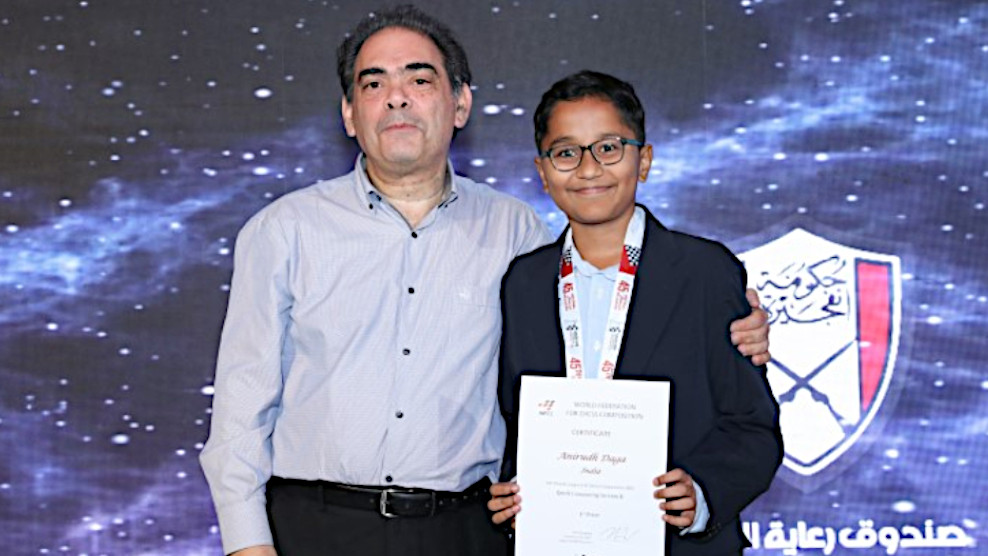
WFCC Honorary President Harry Fougiaxis and Anirudh Daga during the closing ceremony of the Fujairah World Congress of Chess Composition 2022Photo: Fujairah Chess & Culture Club The inaugural FIDE World Solving Championships for Youth (Florianópolis, November 4) and Cadets (Montesilvano, November 21) will take place this autumn. For the first time, the FIDE solving events will be organized in cooperation with the World Federation for Chess Composition (WFCC) as a part of the FIDE & WFCC Special Projects 2024, celebrating FIDE Centenary. The WFCC-guided solving events can be followed on the Chess-Results server, in the Federation Selection list under the abbreviation WFC. The basic information includes Regulations for championships U14, U16 & U8 in Brazil, and for championships U8, U10 & U12 in Italy, both with instructions about writing solutions and illustrative examples. There are also Registration forms for Florianópolis and for Montesilvano. Another important and unique novelty in the FIDE & WFCC cooperation, the first installment in a series of free online solving lessons organized by a young Indian player, composer and solver Anirudh Daga (16), in cooperation with the WFCC president Marjan Kovačević will be launched in two weeks, on September 7. Although primarily aimed to prepare young participants for solving in Brazil and Italy, the online sessions will be open for everybody around the world. Fill out the Registration form to show your interest, by clicking on the given link or scanning the QR code below, using a phone! The initial goal is to explain the big structural differences between common chess puzzles that dominate the Internet and real chess compositions, with their own principles, theories, themes, schools, and styles that have developed throughout chess history. Naturally, priority will be given to practical aspects of solving. The first topic will be the general approach to the competition, including the way of writing solutions. The next sessions will touch on special aspects of composing genres featured in the FIDE Youth Championships 2024: Mate in 2, Mate in 3, Mate in 4 and Endgame Studies. The sessions will be in English and open to all questions each Saturday from 1 PM GMT from September 7 to October 5. How difficult can the problems for cadets and juniors be? A week ago, Prague hosted the European Youth Chess Solving Championships in the age categories U10, U14, and U18, and only two out of 206 solvers managed to score a maximum of 40 points. Let’s take a look at the endgame from U14 category competition: Viktor A. Nikolaev White to play and win At first glance, the position doesn’t promise any headache. It looks like white just has to stop the passed pawns, while g-pawn will secure them an easy victory. Many solvers started correctly and, after White’s smart fourth move, believed the mission was accomplished. In fact, the real fight just started at this point … We have got used to thinking for the white side, but looking for an inspired counterplay by an opponent is often a real challenge. Polish junior Wladyslaw Pycinski was perceptive enough to keep analyzing in-depth, and it brought him the golden medal ahead of the participants who rushed to hand in their solving sheets earlier in order to gain the advantage of the shorter time that is used as the main tiebreak. In the photo from Prague, you can see a young solver at the beginning of the long journey to solve this endgame study, looking for White’s correct second move. Photo: EYCC / Anezka Kruzikova Get registered and prepared for the upcoming solving adventures in Brazil and Italy; there will be no opponents except for hard-to-find moves! Solution: Viktor A. Nikolaev, 2. Prize USSR Sports Committee, 1955 1. Nf3 d3 2. Bh6 Kd4+ 3.Nxd4 e1=Q 4.Bd2+ Ka6 5. Bxe1 d2 6. Nc2 d1=Q 7.Nb4+ Ka5 8.Nd3+ Ka4 9. Nb2 Written by Marjan Kovačević, WFCC president Official website: WFCC – World Federation for Chess Composition
Farewell from Tbilisi: Closing ceremony of Women’s Grand Prix 2024/2025 fist leg
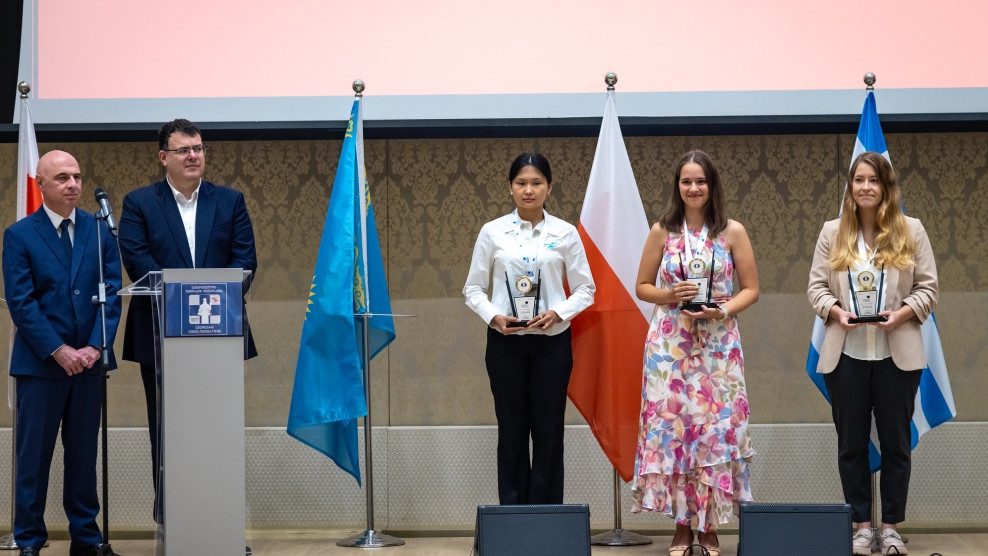
The inaugural leg of the 2024/2025 Women’s Grand Prix concluded in Tbilisi with a closing ceremony that honored the winner, celebrated the participants, and highlighted the significance of women’s chess in Georgia. The ceremony took place in the ballroom of the prestigious Biltmore Hotel, located in the heart of Tbilisi. Just hours earlier, this same venue witnessed the final moves that determined the fate of the world’s top female chess players. Akaki Iashvili, president of the Georgian Chess Association, praised the players for their extraordinary performances, stating, “These 11 days were emotionally intense, but I believe our esteemed guests have enjoyed Georgian hospitality. The GCF and FIDE have worked hard to provide the best conditions for players to showcase their talents in the tournament.” He also expressed gratitude to the Ministry of Sports and Culture of Georgia and the Tbilisi municipality for their unwavering support of chess, a sport deeply respected in Georgian culture. One of the most famous Georgian and world chess players, the legendary Nona Gaprindashvili, congratulated the players on their games and praised Tbilisi for hosting such a prestigious event. “It was a pleasure to have such a high-level tournament in Tbilisi, and I am happy that more chess projects are on the way, offering great experiences for both players and spectators. I visited almost every day to watch the games. Some players won, some lost—that’s sport. I wish the chess players who didn’t achieve great results better success in the future,” said Gaprindashvili. FIDE CEO Emil Sutovsky echoed these sentiments, noting that “the past 11 days flew by quickly, as the games were enjoyable.” “FIDE has about 200 federations, and we host our events in 50 countries, but there are only a handful of federations where we can be confident the events will be of a very high standard, and the Georgian Chess Association is one of them. This event surpassed even our very high expectations,” said Sutovsky, who concluded his speech with a toast to Georgia and its people. The highlight of the ceremony was when the top three players—Alina Kashlinskaya, Bibisara Assaubayeva, and Stavroula Tsolakidou—were invited to the stage to receive their awards: a trophy and a medal. The winner, Alina Kashlinskaya, was greeted with the loudest applause. “This is my biggest achievement so far. I want to thank FIDE for the opportunity to play here. I want to thank my biggest strengths—my son and my mum,” said Kashlinskaya. The evening was filled with music, celebration, and a sense of accomplishment. Notable public figures, state officials, and chess players were among the attendees who enjoyed a performance by the famous Georgian group ‘Quartet Four’ and a vibrant dance group performing traditional Georgian dance. The ceremony, as well as the entire tournament, underscored Georgia’s unique role in the global chess community as an excellent host and organizer. The next major chess event the country will host is the 2025 Women’s World Cup, scheduled to take place in Batumi next July. Written by Milan Dinic Photos: Anna Shtourman Official FIDE WGP website: womengrandprix.fide.com/
FIDE 100 Torch Relay reaches United Arab Emirates
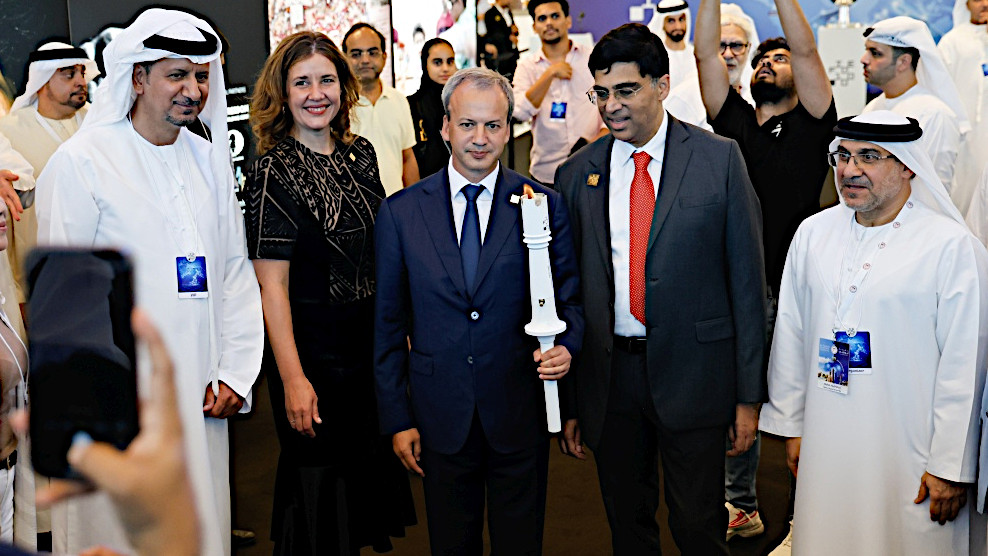
The celebration of FIDE’s 100-year anniversary continues as the FIDE 100 Torch Relay arrives in the United Arab Emirates. This is the last stop of the torch before it reaches its final destination in the Hungarian capital, Budapest, coinciding with the launch of the 2024 Chess Olympiad scheduled from September 10 to 23. The event was held at Marina Mall in Abu Dhabiunder the patronage of the Abu Dhabi Sports Council and organized by the Abu Dhabi Chess and Mind Games Club. The event was attended by His Excellency Sheikh Nahyan bin Mubarak Al Nahyan, Minister of Tolerance and Coexistence, FIDE President Arkady Dvorkovich, His Excellency Sheikh Saud bin Abdulaziz Al Mualla, Vice President of the International Federation, Hussein Abdullah Al Khouri, Chairman of the Board of Directors of the Abu Dhabi Chess and Mind Games Club, Mohammed Al Mudahka, President of the Qatar Chess Federation, Viswanathan Anand, five-time World Champion and Deputy President of the International Chess Federation, alongside officials from the Abu Dhabi Sports Council. His Excellency Sheikh Nahyan bin Mubarak Al Nahyan received the commemorative gold medal from Arkady Dvorkovich on the occasion of the centenary celebration. He also participated in the launch of the exhibition matches on the sidelines of the ceremony. Mohammed Al Mudhahka and the African and Arab champion, Grandmaster Ahmed Adly, played against 15 players simultaneously. During the ceremony, Arkady Dvorkovich noted that the game of chess is rapidly developing in the UAE, thanks to the support it receives and the increasing interest it holds. He additionally expressed his happiness with the great passion of the participants in the 30th edition of the Abu Dhabi International Chess Festival. Hussein Abdullah Al Khouri stated that the torch relay event in Abu Dhabi, held to mark the centenary of the International Federation, achieved great momentum. The event was attended by His Excellency Sheikh Nahyan bin Mubarak Al Nahyan and senior officials, further solidifying the UAE and the Emirate of Abu Dhabi’s strong position in organizing and hosting international sporting events. The torch relay in Abu Dhabi was in sync with the ongoing 30th Abu Dhabi International Chess Festival. Known as the region’s largest chess festival and one of the world’s best, it welcomed more than 2,200 players from 82 countries this year. Its spotlight tournament is the Master’s tournament, which hosted 217 overall players, 200 of whom are titled. In round 7, the Master’s tournament was inaugurated by FIDE President Arkady Dvorkovich and five-time world Champion and FIDE Deputy President Viswanathan Anand.
Kashlinskaya wins the first leg of 2024/2025 Women’s Grand Prix
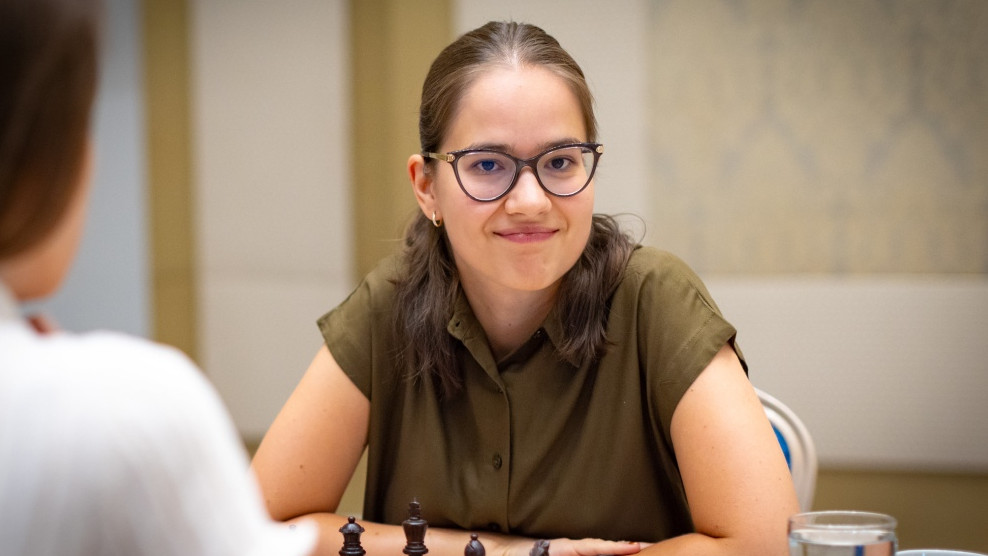
After 10 days and nine rounds of play, Alina Kashlinskaya – playing for Poland – secured first place with a victory against Ukraine’s Mariya Muzychuk in the final round, finishing with six points. Second place went to Kazakhstan’s Bibisara Assaubayeva, who ended with five points. Three players shared third place, with Greece’s Stavroula Tsolakidou emerging on top due to superior tiebreaks The first in a series of six tournaments in the new edition of the Women’s Grand Prix concluded in Tbilisi with high drama, as the winner was decided in the final game of the tournament. Apart from Assaubayeva, Kashlinskaya was the only other player entering the final round with five points. In the decisive match, Kashlinskaya faced Mariya Muzychuk, who was trailing by half a point. From the onset, it was clear that this would be a tough contest. Playing the Ruy Lopez, both sides were cautious in the early stages, resulting in an even position. Kashlinskaya offered Muzychuk a chance to head for a draw with the Zaitsev variation, but Muzychuk chose to fight on. This decision backfired, and by move 32, Muzychuk was significantly weaker; by move 39, she was completely lost. With this victory, Kashlinskaya also secured the leading position in the WGP series, with 130 points. Assaubayeva is in close second with 105. Kashlinskaya: ‘My 10-month-old helped me win’ “I am so happy to win this tournament. I played a decent game and won,” said Kashlinskaya in an interview immediately after the game. Kashlinskaya mentioned that she typically doesn’t follow other games during the round, even those crucial to her standing. “But somehow, in this game [between the other leader of the round – Bibisara Assaubayeva and Vaishali Rameshbabu], I decided to check it out. I saw that Vaishali was in time trouble and that the position was in Bibisara’s style, so in my head, I understood she would win this game, so I was surprised when it was a draw.” Kashlinskaya was the only player in the tournament accompanied by her child – 10-month-old Anthony, who was often seen with Alina and her mother at the hotel restaurant. When asked whether the presence of her toddler was more of a help or a hindrance to her game, Kashlinskaya quickly responded: “Well, you see the results. He helped a lot.” “I will definitely bring him with me to the next tournament,” she added, noting that her son even has chess pieces hanging from his pram, suggesting that his future may be connected to chess. When asked if she would encourage other chess moms to bring their children to events, Kashlinskaya said: “Of course. Again, my result speaks for itself. And for motherhood, it is important to be with the baby as much as possible.” FIDE has launched the project ChessMom to encourage players with small children to take them to the forthcoming Olympiad in Budapest. Assaubayeva second, Tsolakidou third Bibisara Assaubayeva played as Black against Vaishali Rameshbabu. Given Vaishali’s shaky performance in the event, this match presented a significant opportunity for the Kazakhstani player. Despite quickly equalizing in the Sicilian, Bibisara neither pressed the position nor created any substantial chances, leading to a draw after 22 moves. Assaubayeva explained after the game that her thoughts were still on her round-eight match, where she failed to convert a completely winning position against Tsolakidou. With 5.5 out of nine points, Assaubayeva awaited the outcome of the game between Mariya Muzychuk and Alina Kashlinskaya to determine whether she had secured first place. Vaishali, meanwhile, acknowledged that this was not her best tournament, noting that she needs to improve her time management, among other areas. Stavroula Tsolakidou, playing as White, drew with Alexandra Kosteniuk in the English Opening. Despite having an almost winning position a couple of times, Tsolakidou managed only a draw. Still, with 5.5 points and no defeats in her first appearance at the Women’s Grand Prix, this was a significant success for the Greek player. Kosteniuk finished on four points. In the final round, Nana Dzagnidze played as Black against Sara Khadem. Dzagnidze, one of the tournament favorites, often squandered advantages and lost games where she had the upper hand. Meanwhile, Khadem, having not competed in tournaments for the past six months, struggled with her matchups in Tbilisi. In their Nimzo-Indian game, Dzagnidze gained a winning position early on but let her advantage slip. Fortunately for her, Khadem made a blunder that led directly to a lost rook endgame. Dzagnidze finished in a solid fourth place, with 5/9, which she described as “a fair result,” though she noted, “looking at my games, it could have been seven out of nine.” Khadem ended the tournament in last place with 2.5 points. Anna Muzychuk drew as Black with Lela Javakhishvili. In the Indian Game, neither side created any chances nor offered any significant opportunities, resulting in a calm draw after 40 moves. Javakhishvili finished the tournament with five points, while Lela ended on 3.5 out of nine. FIDE WGP Standigns Here follows a closer look at the games from round nine: Stavroula Tsolakidou – Alexandra Kosteniuk This was a crucial game for Tsolakidou, as she was just half a point behind the two leaders. Stavroula played the English Opening, and the game started well for her – her pieces were more active, and she had the initiative on the board. In the middlegame, Stavroula had a better position but misplayed it. Here White could have obtain a decisive advantage with energetic 23.e5! but opted for a sluggish 23.Qe3. Still, the Greek got two more chances to seal the deal but missed the opportunities. The second miss was particularly bitter. After Kosteniuk’s 41…Qb5?? White could have won with 42.Qxh5 Qxb3 43.Qg4+ Kf8 44.Qc8+ Kg7 45.Qd7+ Kh6. Instead, Stavroula played 42.Qe6??, allowing Black to pick up a pawn and exposing her king to perpetual checks. Vaishali Rameshbabu – Bibisara Assaubayeva Vaishali Rameshbabu faced the top favorite of the round, Bibisara Assaubayeva, who was tied for first place with five
Kashlinskaya and Assaubayeva neck and neck in a round of missed opportunities
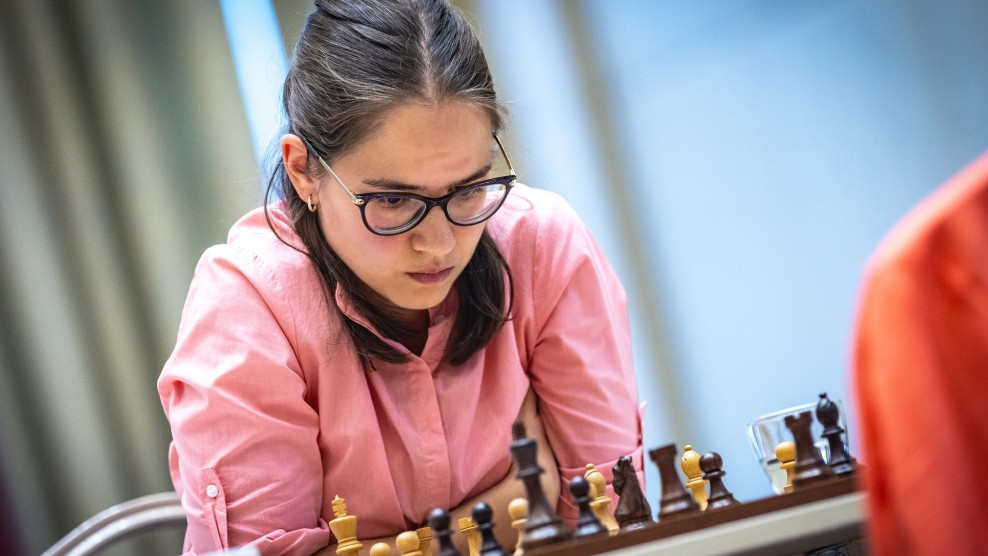
With just one round remaining at the Women’s Grand Prix in Tbilisi, two players are now tied for first place: Alina Kashlinskaya, who won, and Bibisara Assaubayeva, who drew her game. The day was marked by missed opportunities across the boards, indicating fatigue among the players The day witnessed dramatic swings in all games, as players struggled with the pressure and fatigue after eight intense rounds. Notably, this was only the second round in the entire tournament where more games ended with decisive results instead of draws. Alina Kashlinskaya emerged as the biggest winner of the round, tying for first place following her victory against Georgia’s Lela Javakhishvili in the Nimzo-Indian. It was the longest game of the round, finishing in just over five hours. Despite faltering in the middlegame and losing her advantage, Kashlinskaya managed to break through and win. With this victory, Kashlinskaya now has five points, while Javakhishvili remains on three. Bibisara Assaubayeva, who led the tournament after round seven, squandered a completely winning position against Stavroula Tsolakidou, missing an opportunity to extend her lead over the field. In the English Opening, things started well for Bibisara, but she misplayed and allowed Black to seize the initiative. Then, after Tsolakidou’s mistake, the tables turned completely, putting Bibisara in a winning position. However, with one misstep, Assaubayeva threw away the victory and had to fight for a draw. A big miss for Bibisara (now on five points) and a fortunate break for Tsolakidou, who is now on 4.5 points. Anna Muzychuk defeated Sara Khadem in the Giuoco Piano. This was the first game of the round to finish. Khadem held a solid position until the middlegame, when she pursued a faulty plan and underestimated back-rank threats, ending up losing. With this victory, Anna Muzychuk moved to 4.5 points, while Khadem remains on 2.5. In the Scotch Game, Alexandra Kosteniuk and Mariya Muzychuk exchanged mistakes throughout. Despite having several completely winning positions, Mariya Muzychuk let them slip, resulting in a draw. In the post-game interview, Mariya Muzychuk (now on 4.5 points) mentioned that she felt she had the upper hand but that fatigue was taking its toll. Alexandra Kosteniuk (on three points) left the venue quickly after the game, visibly exhausted. Nana Dzagnidze lost to Vaishali Rameshbabu in a sharp encounter. Despite achieving a strong initiative in the King’s Indian, Dzagnidze overextended and ended up losing. This defeat dashed Dzagnidze’s hopes of reaching the top spots, as she remains on four points. With 3.5 points, Vaishali has climbed up from the bottom of the leaderboard. Standings after Round 8 Saturday, August 24, marks the final round and the last chance for players to improve their standings. With two players tied for first place and three players just half a point behind, the final day promises excitement and surprises. The games will begin at 1 PM local time in Tbilisi, with the closing ceremony and the announcement of the winner scheduled for 8 PM. Here follows a closer look at the games of round eight: Alexandra Kosteniuk – Mariya Muzychuk In the Scotch Game, Kosteniuk was facing challenges early in the opening after playing a rare line starting 9. Nd2. The opponents traded inaccuracies transitioning from the opening to the middlegame but it was Black, who eventually emerged clearly better. However, Mariya did not find the best continuation at the first critical moment of the game. 27…Nb3? Black’s main idea is to play c6-c5 and 27…Ne4 served this purpose. The point is that 28.f3 fails to 28…Nxg3 29. Kxg3 c5! Black regains the piece and gets an overwhelming position as White’s king is very weak. After 28.Nxb3 Rxb3 29.Bd4 White was holding, but not for long. After exchanging a couple of mistakes the two transitioned to an even rook endgame, with Black having an extra pawn. Kosteniuk made another mistake after which she was lost. Black has just played 42…c6? (instead of 42…Ke6, winning) and threw a lifeline to White. Alexandra, however, opted for 43.g5?? 43.f5 or 43.Rb4 were holding moves. Now, with this move, Kosteniuk allowed Black a chance to reactivate the king and central pawns and get the upper hand again. But it was not the end of the story as Mariya was the last to err in this topsy-turvy game. 47…Kg7?? Instead of playing actively and supporting the progress of her central pawns with 47…Ke5, Black put her king on the defense. After 48.Kxg5, Kosteniuk created a passer on the h-file, and the position became even. The struggle continued, but neither side made any significant errors afterward, and a draw was agreed upon at move 64. Alina Kashlinskaya – Lela Javakhishvili Alina Kashlinskaya obtained a notably better position against Lela Javakhishvili in the Nimzo-Indian. White made a push in the center, but Black did not respond correctly, giving the opponent an advantage. White has control over the center, a pair of bishops and better chances to organize an attack. Alina did not hesitate to break through in the center. 17.d5! exd5 18.e5! Ne4 19.Bd2 Nxg4 20.hxg3 d4 White is now significantly better and Black needs to find ways to block off the bishops. But Kashlinskaya was slow in her attack and soon lost her advantage. Despite Black not choosing the best moves, White missed her chances. After the exchange of heavy pieces, including queens, the position was about even, but White still had the initiative. 29.e6 fxe6?? A blunder, after which Black loses an exchange. She should have captured with the knight with a defendable position. 30.Bxd4! cxd4 31.Bxe6+ Rxe6 32.Rxe6 d3 33.Rd6 Be4 34.Rd7. Save for a slight inaccuracy on move 40, Alina gradually improved her position and converted an extra exchange into a full point. Anna Muzychuk – Sarasadat Khademalsharieh In the Giuoco Piano the position was mostly equal until well into the middlegame when Sara Khadem made an error. The position is about equal. Both sides have completed their development and have active pieces. Black has more control over the center but

